Cynthya Ayala
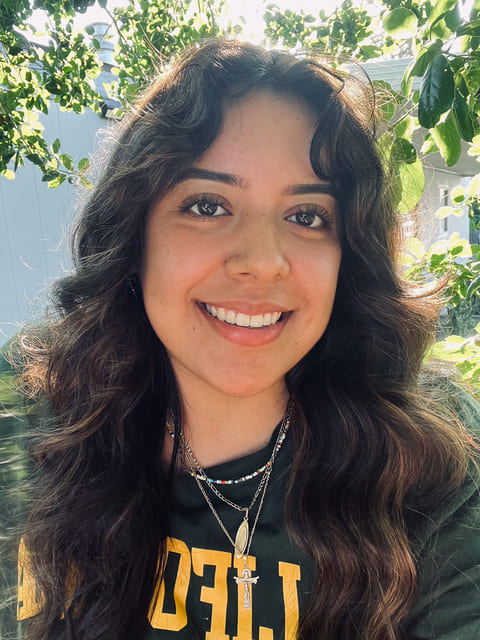 |
- Which year did you graduate from UCSC? Which degree(s) did you obtain?
I graduated in June of 2024, double-majoring in Applied Linguistics and Education and minoring in Spanish Studies.
- What did you do after graduation?
After graduation, I dedicate my time working with Santa Cruz City Schools, something I had been doing since I was a second year undergrad. I currently work in a high school as a Bilingual Paraeducator, being a language aid to transitioning students from other countries that come to the US and enter the public school system. On top of being their bilingual tutor, I work one-on-one with these students to help them gain a sense of belonging to their school, as sometimes it can be a very excluding experience due to the language barrier.
- How has the knowledge and training you received in the Applied Linguistics program helped you in your current work or projects?
As an English Learner myself I was always interested in one day turning my knowledge into a resource for those that needed it most. Being able to take TESOL courses throughout my undergrad career only ignited my desire to turn it into a career. The Applied Linguistics program offered extensive knowledge about the language learning process and made me feel certain that this career path is essential in the education field.
Working alongside skilled professors I also gained the confidence to take my higher education and put it into practice. Their teaching practices is what I hope to replicate in my own profession.
- What are your future plans?
As I continue in my path working with English Learners, I only hope to one day have my own class and be an English Language Development (ELD) teacher. Before that, I plan on applying to a Masters and Teaching Credential program that can direct me towards my future plans.
|
Valentin Barbosa
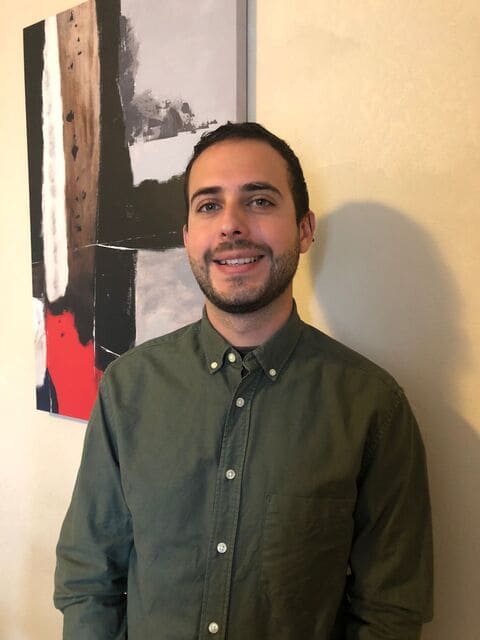 |
- Which year did you graduate from UCSC? Which degree(s) did you obtain?
I graduated in 2022 with a BA in Applied Linguistics, a minor in Education, and a specialization in TESOL.
- What did you do after graduation?
After graduating I decided to move to Spain. I worked two years as an English Teaching Assistant through the NALCAP program. During my second year I came to realize that teaching was not the profession I wanted to dedicate myself to and I decided to go back to school. Last year I started a Master’s program in Linguistics and Technology with a focus on Computational Linguistics at the Universidad Complutense de Madrid in Spain.
- How has the knowledge and training you received in the Applied Linguistics program helped you in your current work or projects?
My work as an English Teaching Assistant greatly benefited from the knowledge and training I obtained at UCSC. Before stepping into the classroom, I understood what I might encounter and how to handle it. Although the program didn’t offer much hands-on teaching practice, I knew the goals and outcomes to aim for when preparing a class or assessing a student’s proficiency. As for my current studies, the classes I had through the Linguistics department are proving to be very useful. I wish I had done a double major in Linguistics and Applied Linguistics during my time at UCSC to be better prepared for my MA.
- What are your future plans?
After I finish my MA, I hope to secure a position as a computational linguist in the artificial intelligence industry or other language technology firms. I believe linguists play a pivotal role in shaping both the present and future of AI. Many of these systems only predict the next word without truly understanding its meaning. Professionals like us can contribute to develop these models to ensure fair and transparent outcomes.
|
Susan Nguyen
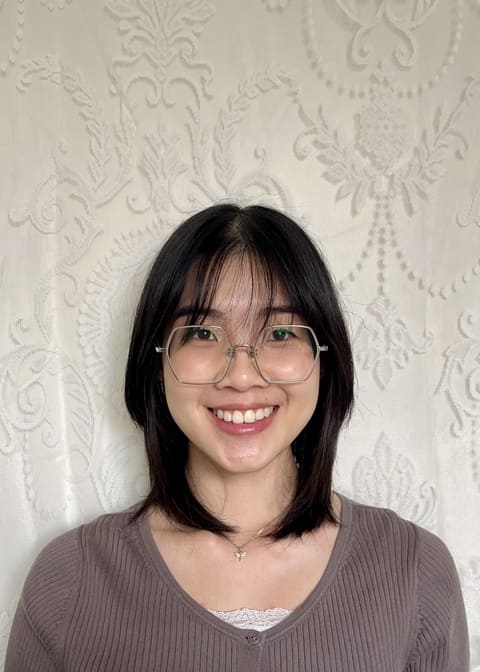 |
- Which year did you graduate from UCSC? Which degree(s) did you obtain?
I graduated in 2022 with a B.A. in Applied Linguistics and a B.A. in Computer Science.
- What did you do after graduation?
I taught English in Taiwan for two years through Fulbright. For me, it was the perfect chance to put my applied linguistics knowledge to practical use and explore new environments while I figured out what I wanted to do next. I started off as a teaching assistant in elementary schools, then I moved to a university where I organized workshops for their English Medium Instruction program.
Teaching made me miss being a student! It solidified my interest in bilingualism and language acquisition, and I wanted to learn more, so I decided to return for my master’s in linguistics at San Diego State University.
- How has the knowledge and training you received in the Applied Linguistics program helped you in your current work or projects?
The research skills I developed in the APLX program are incredibly useful to my current work as a graduate student. Even now, I still refer back to my old papers as academic writing templates. I also regularly draw on my applied linguistics knowledge for many of the classes that I take. On a more personal note, the APLX department was like a home for me. Being excited to go to class and knowing everyone in it helped me grow more confident in speaking up, which is an invaluable skill to have. Through the support of my professors and cohort, I learned to embrace my identity as a multilingual speaker and find my purpose in teaching and working with languages.
- What are your future plans?
For now, I plan to make the most of my time at SDSU and finish every semester strong. I’m also in the process of obtaining a certificate in computational linguistics—it’s something I’ve been interested in for a while as it ties into both my applied linguistics and computer science backgrounds, and I want to see what I can do with language technology. Aside from that, I’ve got a long list of books I want to read and a dream of one day finishing them all.
|
Stuart Warren
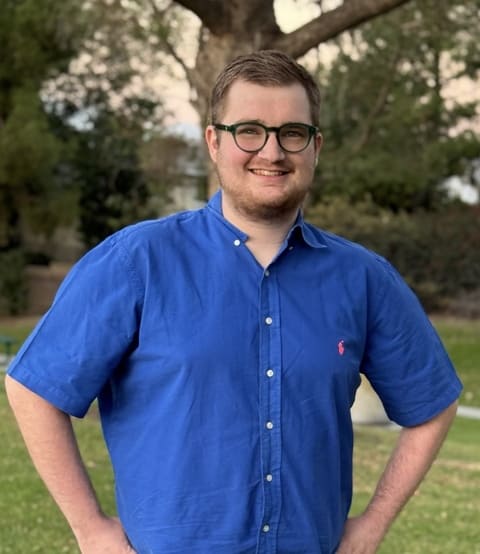 |
- Which year did you graduate from UCSC? Which degree(s) did you obtain?
I graduated from UCSC in 2023 with a Bachelors of Arts in Applied Linguistics and Multilingualism. I also earned a TESOL certificate(Teaching English to Speakers of Other Languages).
- What did you do after graduation?
After graduation I began working as a substitute teacher at the secondary level in a local public k-12 school district.
- How has the knowledge and training you received in the Applied Linguistics program helped you in your current work or projects?
As someone who now works in public education, I am regularly put into ELD classes that serve students from a variety of different linguistic backgrounds. Classes such as Multicultural Communications and Second-language Acquisition gave me tools to help the multicultural and multilingual communities with whom I work. I had the opportunity to take a long term position in a Spanish Class in which I was able to produce activities using the pedagogical theory I have learned throughout the program at UCSC. I am thankful for the foundation given to me by the department faculty.
- What are your future plans?
This September I will begin a masters program in Applied Linguistics for TEFL at Bangor University in Gwynedd, Wales. This university is nestled in the most Welsh/English bilingual areas of Wales. I am currently learning Welsh, so living there will give me the opportunity to practice and learn the practice of education within a minority language community. I hope to be able to use my time in this community to further expand my abilities in the study of Bilingualism and Language pedagogy. Obtaining this degree will open up many and varied pathways. I could use it to specialize in the teaching of English, or take a more research oriented path. To be able to weave the Welsh Language into my academic and career path is a unique joy. I am thankful for the foundation given to me by my time at UCSC.
|
Nicole Sandoval-Gutierrez
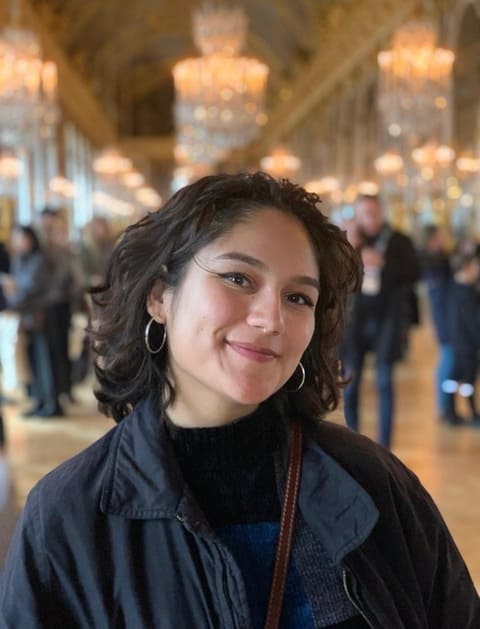 |
- Which year did you graduate from UCSC? Which degree(s) did you obtain?
I graduated in the spring of 2021.
I obtained a B.A. in Applied Linguistics and Multilingualism. My sophomore year, I spent a semester abroad in Bordeaux, France. Through a UCEAP program, I followed intensive French classes at the Université Bordeaux Montaigne.
- What did you do after graduation?
In the fall of 2021, I moved to Nîmes, a small city in the south of France, to teach English in a primary school. I was able to do this through the Teaching Assistant Program in France (TAPIF), an excellent post-grad program for anyone with a background in French. I fell in love with southern France and decided to continue my studies while I figured out what to do with my life. I spent a year in Perpignan, where I waited tables and took French classes. I was eventually accepted into the Teaching and Learning of French as a Foreign Language master’s program at the Université Toulouse II-Jean Jaurès, and moved to Toulouse in fall of 2023. I am currently in the last semester of this two-year master’s program.
- How has the knowledge and training you received in the Applied Linguistics program helped you in your current work or projects?
The APLX degree has affected my future in ways I could have never predicted. “Applied Linguistics” is a broad field, and the classes at UCSC helped narrow down what exactly I planned to do with this degree. I most enjoyed the classes which dealt with L2 acquisition so I began envisaging a career as a foreign language teacher. The research-based classes, like the final-year keystone course, were difficult for me at the time but have since been immensely helpful as I continue my education. The APLX program was where I learned to read research papers, interpret data, and develop my academic writing. Now, in the midst of my master’s degree, I call on these skills for nearly all of my university work and am grateful that the professors in the APLX program prepared me thoroughly for the road ahead.
- What are your future plans?
For the next six months, I will be working on my master’s thesis and completing a 300-hour internship at the Council on International Educational Exchange (CIEE), an organization which hosts study abroad programs for American students. After this, I must defend my thesis in front of a jury and then, hopefully, will obtain my degree. I originally planned to return to the US and search for work as a French teacher with this degree but recent developments there have made me reconsider my options. Now, I think I’ll stick around in France for a few more years and look for work as a language teacher— preferably at the university level as a lecturer. After that, I'll see where life takes me.
|
Mia Balseley
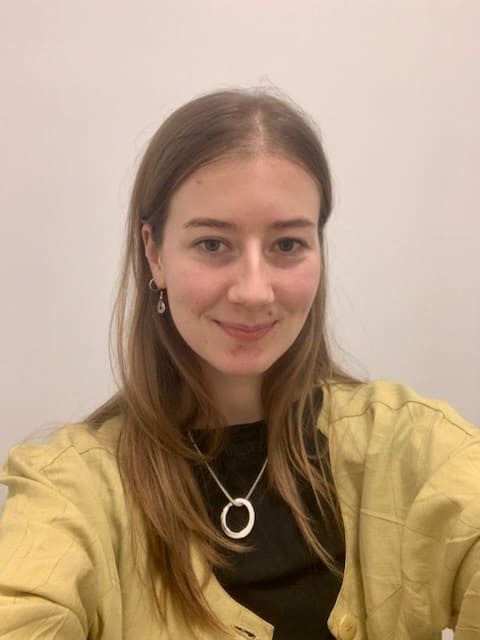 |
- Which year did you graduate from UCSC? Which degree(s) did you obtain?
I graduated with honors from UCSC in March 2024 with an Applied Linguistics degree and TESOL certificate.
- What did you do after graduation?
I moved to Trier, Germany to begin my Master’s degree in Natural Language Processing and Computational Linguistics.
- How has the knowledge and training you received in the Applied Linguistics program helped you in your current work or projects?
The knowledge and training I received in the APLX program helped me to work as a German teacher in the US, privately teach English in Germany, and contribute my linguistic understanding to my speech-language pathology internships in Germany, California, Oregon, and Washington State.
My APLX degree has taught me so much about intercultural and cross-cultural contexts which helped me prepare to now be living, working, and studying in an internationally & linguistically rich environment.
- What are your future plans?
I am currently completing my Master’s degree to continue forward with computational linguistics. At some point, I would also like to work as a TESOL teacher in Germany. With my natural language processing degree, I hope to either work in an international context (e.g. in the United Nations or with endangered languages, etc.), to work in the speech-language pathology direction (e.g. with augmentative and alternative communication devices), or to go in the research direction. My APLX degree has granted me a wide range of career options and has enriched my understanding of the world and its tongues.
|
Maria Cecilia Soto
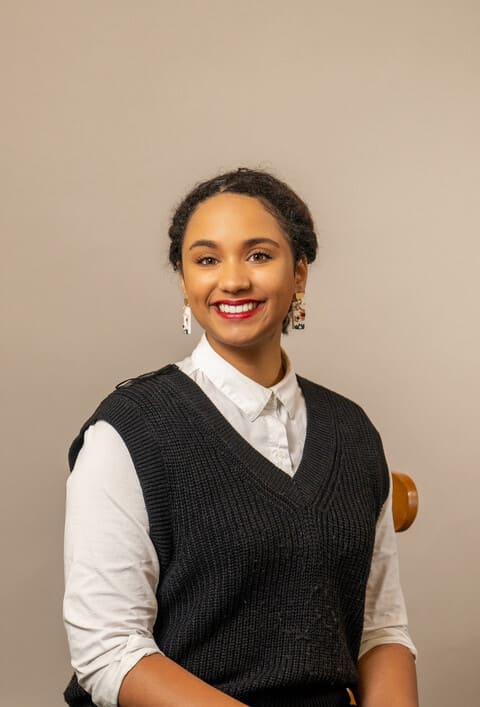 |
- Which year did you graduate from UCSC? Which degree(s) did you obtain?
I graduated early and with highest honors (Cum Laude) from UCSC in 2023 with a Bachelor’s of Arts in Applied Linguistics and Multilingualism and Linguistics. In this double major program, I also completed the Applied Linguistics Department’s Teaching English as a Second Language (TESOL) credentialing program.
- What did you do after graduation?
After graduation, I worked as an immersive English teacher overseas at a middle school in Seoul, South Korea. Currently, I am back in California working towards a full-time teaching credential in English and Mild/Moderate Support Needs.
- How has the knowledge and training you received in the Applied Linguistics program helped you in your current work or projects?
If it wasn’t for the coursework in the Applied Linguistics program, I likely would have had some difficulty starting my career in education immediately after graduation. The TESOL program classes specifically equipped me with the knowledge and tools necessary to easily transition into full time language teaching abroad. Additionally, the connections I made with other students and faculty in the Applied Linguistics department provided me with a community to seek insight from after graduation while transitioning into the work force. I am very thankful for the continued support!
- What are your future plans?
Moving forward, I plan to obtain and clear a California teaching credential in English so that I can teach at middle and high schools. Literacy and college-readiness are still important to equip students with, possibly now more than ever. I look forward to seeing how I can help others and continue to grow as an individual.
|
Gio Distefano
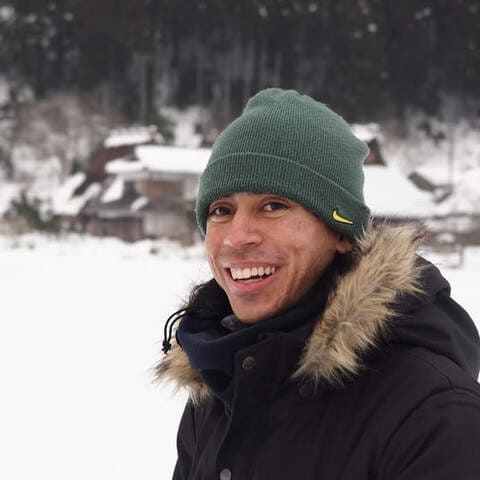 |
- Which year did you graduate from UCSC? Which degree(s) did you obtain?
I graduated in June of 2022 with a degree in Applied Linguistics and Multilingualism. I specialized in Japanese.
- What did you do after graduation?
After graduation I was fortunate to be accepted into the "Study in Kansai Program" hosted by Ritsumeikan University in Kyoto. Due to the pandemic, I was never able to study abroad before graduating so this was an excellent opportunity to experience the life overseas I had always wanted. I enrolled in the program's 1-year intensive Japanese track, picking up where my studies at UCSC left off. It was an amazing experience to be able to immerse myself not only in Japanese culture, but to also meet many people from all over the world. I then went on to work for a local hotel group, working with a diverse group of Japanese and foreign staff. My use of Japanese in business settings improved greatly and I was able to help other staff improve their English skills as well.
- How has the knowledge and training you received in the Applied Linguistics program helped you in your current work or projects?
Besides giving me new tools and insights into my own language learning, participating in the Applied Linguistics program has given me a much deeper understanding and appreciation of how we communicate in our daily lives. Whether it was when I was greeting guests from all over the world at work or speaking casually with Japanese high schoolers, I felt as though I had more insight into the myriad of factors at play beyond our words. While the things I learned may not be technical in any way, the perspective I've gained is extremely practical when it comes to thinking about everyday small talk to large topics like how the news is written. Moreover, it's given me the confidence to work in multi-disciplined environments and to pursue higher education in a related field or to go into research.
- What are your future plans?
Although I decided to move back to California, the experiences I've accumulated at home and abroad have made me want to pursue a career that embraces communication and cooperation between peoples. My goal is to pursue work at the state level before earning my Master's or applying for the U.S. Foreign Service.
|
Eleanor (Ellie) Wilson
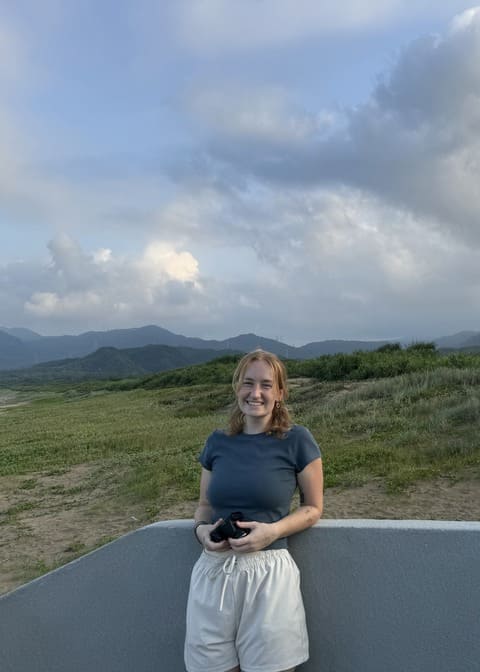 |
- Which year did you graduate from UCSC? Which degree(s) did you obtain?
2023. Double BA in Applied Linguistics + Literature (Creative Writing)
- What did you do after graduation?
After graduation, I worked for a year and applied for an English teaching grant with the Fulbright program. I received the grant and am now an elementary school English teacher in Taiwan.
- How has the knowledge and training you received in the Applied Linguistics program helped you in your current work or projects?
My background in APLX helped me be selected for the Fulbright award, as many other grantees were required to have a TEFL certification or years of classroom experience to be selected, while my undergraduate degree alone sufficed. Furthermore, I use my APLX training every day in the classroom, specifically L2 acquisition and EFL methods, both of which were courses I took at UCSC. Being an APLX graduate has made me better qualified for my current position as a Fulbright English teacher than my peers from other backgrounds.
- What are your future plans?
After leaving Taiwan, I plan to pursue a higher degree in Applied Linguistics and work in language labs as a graduate student. I’m interested in researching adult language acquisition and improving language learning methods for older and adult language learners.
|









